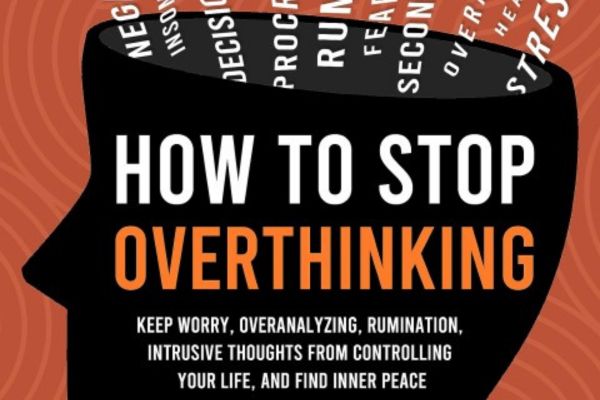Overthinking literally meaning to think about a specific situation excessively or overanalyzing it for a long time. It is a mental trap that consumes your time and mental and physical strength; it triggers the process of emotional deregulation and causes a detrimental impact on your life. Mental ailments such as bipolar disorder, anxiety, post-traumatic stress disorder (PTSD), obsessive-compulsive stress disorder (OCD), and other stress and depression-related mental states are often associated with overthinking. Delaying to spot overthinking can have long-term consequences.
When you focus too much on what you have done wrong in the past or what you might do wrong in the future, this may actually serve as an obstacle. This article discusses eight simple strategies that will enable you to divorce yourself from the excessive overthinking cycle. These strategies will help release inner calm and order in the storm, from mindfulness practice and physical movement to self-affirmation and cognitive restructuring.

How to Spot Overthinking Patterns
Are you entangled in the vicious trap of overthinking? Have you ever noticed that you are in a constant state of worry? Whether you are fretting over the new market trends impacting your products or agonizing about the negative feedback from your client or your employees, retention has become a nightmare for your newly established business. You may get trapped under the overthinking patterns.
Rumination is the mental loop where you dwell on past situations, particularly distressing and damaging thoughts. Constant evaluation of past failures or regrets can cause rumination and overthinking patterns. Sometimes, people find it challenging to overcome past orientation. However, future tripping and negative retrospection is the overthinking pattern, where you are overly concerned with future anticipations. It refers to the point where you hold back from the present situation and fear of having failure. It is a challenging form of overthinking, as fear of the unknown makes it more complicated. The third overthinking pattern is overanalyzing, the combined effect of rumination and future tripping. It is a point where you dive into the depth of anything, excessively analyze things to acquire better results, and start overthinking irrelevant thoughts. Understanding the overthinking pattern conserves energy, time, and mental health and regulates emotional balance.
How to Shift Your Focus from Problems to Solutions
Instead of being caught in the whirlpool of thoughts, you must know the techniques how to face the overthinking patterns. Counterintuitively, it is the method where you schedule and organize your overthinking patterns, ‘worry time,’ letting you organize your thoughts only for that time; in other parts of the day, your mind is free from overwhelming exposure to thoughts. In this way, you confine your thoughts for hardly 30 minutes and choose a slot where your mind is constantly overthinking.
Ideally, this slot could be on a chair, in a room, or the park; you have to think critically during that time slot, whether your worries are controllable or not, and you are worrying about things that are not worth your time and energy. Another helpful technique that enables you to reach a solution, not a problem, is mental projection in case of future tripping. Ask about the pros and cons of your overthinking patterns. This technique is also known as Temporal distancing, where you reduce the intensity of thoughts. It will help you to be mentally present and think in a more balanced way. Another solution in the case of over-analyzing is the ‘good enough’ technique, which relies on critical decision criteria such as principles, guidelines, and requirements. Knowing these three perspectives, you can quickly solve your over-analyzing thinking pattern.
Overcoming Distractions: Tips For Better Mindfulness
Mindfulness and meditation practices are often used in mind sciences, which are the informed reflections of your psychology, neuroscience, and physiology. Stimulating your brain wave through Alpha or Theta sounds resonates with a high vibration of your mental state and causes relaxation for a while. Jose Silva has introduced several meditation and mindfulness techniques that have proven records of overcoming stress and overthinking patterns.
Silva’s methods, such as 3-2-1 relaxation, mental screening, mirroring of mind, a glass of water, and three fingers technique, make you calmer and relaxed for specific periods. Whether you are anxious about your future goals or stuck in past failures, these energy-healing meditation practices boost your energy field or aura. Mindfulness practices enhance your ability to think beyond the usual pattern, as well as your mental clarity and intuition. It is also a doorway of spirituality, where you can resolve inner conflicts and meet the high level of your mental state.
Easy Strategies to Overcome Negative Thinking
Cognitive reframing or restructuring is another way to develop a positive mindset, a therapeutic process where you can replace your negative or irrational attitude. It is cognitive behavioral therapy (CBT). It is an effective tool to deal with overthinking patterns and halt negative distress. Whether you are churning your thoughts or overly reliant on your thinking patterns, this method helps you process your thoughts accurately. In psychology, these mental breaks are also known as cognitive distortions; CBT aims to rectify these cognitive distortions by increasing awareness of thoughts, awakening questions, neutralizing anger, and reinstating a daytime image. Managing the thought records, ABC belief model, and behavioral experiments are the essential CBT therapies that can help challenge negative thoughts.
Why You Should Get Up and Move to Beat Stress
Physical activities such as aerobics, yoga, stealth exercises, and other physical fitness methods boost mental well-being and shift focus from your present worry state. Visualize that your worries are baggage that you have been carrying for no reason. You need to overcome this baggage by revitalizing your hidden energies. The brain neurotransmitters or endorphins are stimulated by physical activities, impacting calmness and building stamina to face outer and inner challenges. No. Whether playing racquetball, taking a long walk, or taking several laps while swimming, your body secretes stress-free hormones that trigger body balance and relief from stress and anxiety.
Stop Relying on Others: How to Find Your Worth
Whether you are stuck in a financial crisis or bullied by your peers or badge mates and need validation from others to approve your point of view, that is a red flag, as it will cause you more worries and stress. Your locus of control should always be in yourself. Your motivation must come from the inside, not from the outer world. Once you start valuing your thoughts and self, you become self-reliant and mentally independent.
External validation from people creates an unending cycle of second-guessing and self-doubt. We begin to rely more on other people rather than on ourselves. Always looking for reassurances to move forward can have a detrimental impact on your mental well-being and emotional regulation. This attribute diminishes self-confidence and personal development as independent human beings. By valuing your opinion, you gain mental clarity and freedom, and you learn to focus on yourself and personal growth rather than other people’s views.
Tired of Chaos? Create a Daily Routine to Find Your Calm
The daily routine structure reduces overthinking and develops mind focus. By following a routine, you are less prone to wandering thoughts. When you are directed towards a sense of achievement and purpose in yourself, your daily healthy habits harness the best possible results in your life. A structured routine cultivates constant progress in your life and helps you stay anchored in the present moment; it helps in the likelihood of getting lost in mental spirals. You prioritize your tasks and set goals. A structured daily routine breaks down your goals into
manageable steps and develops time blocks for work, leisure, and self-care. If you are habitual in mindfulness practices, meditation, physical activities, and work, you have fewer chances of being trapped in overthinking.
Why Positive Affirmations Can Change Your Mood Quickly
Gratitude to your creator for showering you with countless blessings is the key to unlocking your mental strength. It helps you curtail your overthinking patterns. Your positive affirmations transform your worry and anxiety levels into appreciation and positivity. When you practice gratitude, you start paying attention to what you have, peace, and contentment. The less is more gratitude phenomenon is one strategy that fits all and avoids overthinking patterns.
Paying gratitude encourages you to acknowledge the small joys in life, which harness a more optimistic outlook. Positive self-talk is the counter mechanism against negativity and overthinking patterns. Repeating positive affirmations such as “ I am smart, intelligent, and capable of doing so many things” can create positivity and abundance within yourself. You start fighting with your overthinking challenges. These practices reiterate that overthinking is a habit that can be broken with practice.
In Summary,
Overcoming persistent thinking requires active practice and helpful approaches. First step: look at the cause of your excessive thinking, and when you understand it, use the routines, gratitude practices, affirmations, or exercise to overcome the worrying. Instead, Practicing these habits helps improve mental clarity, emotional stability, and self-confidence. It’s essential to admit that too much thinking isn’t a mental illness but rather a habit, and habits can be changed if dedication and daily efforts are made to do so. Look for one such opportunity today and regain control; your brain will surely appreciate it.


6 Comments
Can you be more specific about the content of your article? After reading it, I still have some doubts. Hope you can help me. https://www.binance.com/register?ref=IHJUI7TF
Thanks for sharing. I read many of your blog posts, cool, your blog is very good.
Your point of view caught my eye and was very interesting. Thanks. I have a question for you.
Your point of view caught my eye and was very interesting. Thanks. I have a question for you.
game 188v áp dụng công nghệ blockchain để minh bạch lịch sử giao dịch – mọi thứ đều có thể truy xuất rõ ràng. TONY01-16
Понятие гедонизма — это направление в философии, которое ставит удовольствие в центр человеческой жизни.
Согласно этому взгляду, стремление к удовольствию считается значимой частью существования.
Этот подход не всегда подразумевает чрезмерность.
Во многих трактовках он связан с умеренностью и контроль желаний.
https://graph.org/Tihaya-roskosh-iskusstvo-nezametnogo-shika-12-25
Актуальная интерпретация часто акцентирует внимание на внутреннем комфорте.
При этом важную роль играет баланс между удовольствиями и обязанностями.
Эта философия может помогать лучше понимать себя.
Таким образом, гедонизм рассматривается как философская перспектива, а не как отказ от ответственности.